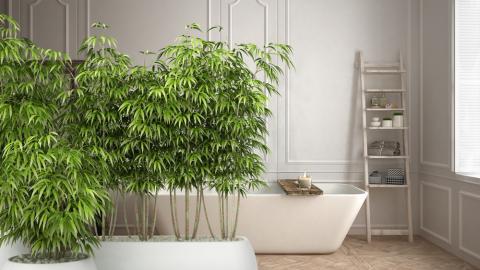
Have you ever found yourself in a flurry to spontaneously reorganize a room or space?
Is there a room in your home that you don’t feel inspired to frequent?
Are you trying to choose the “right” color palette for certain rooms in your home?
Feng Shui (pronounced “Fung Shway”) is the traditional Chinese art and science of balancing energy flow within a space for optimal health and fortune. The origin of the words—“feng,” meaning “wind” and “shui,” meaning “water”—are associated with good fortune in Chinese culture. Similarly, the moving energy of both wind and water serve as an appropriate symbol of the importance of ch’i, or energy, to feng shui philosophy.
Feng shui is similarly informed by the Taoist theory of yin and yang, symbolizing the balancing of female and male energies. Likewise, the five elements—fire, water, earth, wood, metal—assume varying degrees of influence within the feng shui practice. The feng shui practice also addresses both the exterior (the home) as well as the interior (the heart or mind) domains. Tuning into one’s emotions, comforts, and personal history and preferences allows for the feng shui practice to have a more transformative impact on one’s life as a holistic path to good fortune—however one may identify said “fortune.”
Follow these five feng shui concepts to promote optimal flow of chi (energy) within five primary rooms in your home…
1. Soften spaces.
As most rooms in a home are in the form of a “box,” feng shui practice is to choose furniture and design effects that soften angles and corners. In addition to literally “taking the edge off” furniture and design elements, soften the mind with the way items are arranged or presented in the space. This could mean draping fabric over a piece of furniture, angling a piece of chair or shelf in the corner of a room, positioning a plant in a space to bring in organic lines and elements, or keeping chi-draining items hidden from view.
Here are some room-specific suggestions to soften spaces in your home…
- BEDROOM—Since the bedroom should be where one goes to recharge, make the space cozy by covering any exposed furniture edges that may cause an uncomfortable, chi-disrupting bump during a sleepy trip to the bathroom.
- BATHROOM—Bring ease to any bathroom space by tucking the toilet away (with a wall or curtain when possible) from direct sight from the door.
- KITCHEN—Keep knives and trash and recycling cans hidden from sight to focus chi on those most nourishing aspects of the kitchen: a bowl of fresh fruit or a thriving plant on the counter.
- LIVING ROOM—If furniture has “threatening” characteristics like sharp corners or edges, add a blanket or other fabric to bring softness and comfort to the space most used for hosting.
- HOME OFFICE—Camouflage corners (which inspire irritation and aggression) or opt for rounded furniture, which encourages fluidity of creative thought and harmony in a meeting.
2. Keep it clean & clutter free.
Keeping the home clean and organized not only creates a space where chi can flow freely, but also creates space within the mind. “Active chaos” takes the form of creative, energetic bursts that often leave a mess in the wake. Make it a point to clean up after moments of inspiration strike. “Passive chaos” is clutter that has been sitting, building up, and drains chi.
Ask the seven “Clear the Way” questions when addressing passive chaos:
- Do I love it?
- Do I need it?
- Does it support who I am now in my life?
- Does it act as an environmental affirmation for me?
- What positive and/or negative thoughts, memories, or emotions do I associate with it?
- Does it need to be fixed or repaired, and am I willing to do so now?
- If it’s time to let it go, am I going to sell, lend, or give it away…and when?
Here are some room-specific suggestions to keep your space clutter-free and organized…
- BEDROOM—Make the “bed”-room what it is meant to be by removing active workout equipment and your TV if you have one, and avoid storing any items under the bed.
- BATHROOM—The bathroom is where one completes cleansing rituals, and keeping this space separate from the laundry room can limit clutter from dirty clothing.
- KITCHEN—Don’t let mail and other items that are not purposeful in the kitchen pile up on the countertops, and store those countertop items that are not used daily.
- LIVING ROOM—Keep electronic equipment out of sight (such as in a cabinet or drawer) when not in use, and to enhance serenity when sharing company.
- HOME OFFICE—Find an organizational system that works and follow through with it; chi cannot flow easily through piles of paper and other clutter.
3. Learn from Mother Nature.
Nature is our greatest teacher, and feng shui philosophy considers the elemental role (fire, water, earth, wood, or metal) of objects in their placement within the home. Balance chi within the home by using colors that are inspired by those found in nature—whatever the hue. Incorporate nature objects that inspire memories of outdoor experiences, such as baskets of shells, rocks or fossils, or other found items like seedpods, for example.
Here are some room-specific suggestions to incorporate nature into your space…
- BEDROOM—Choose paint colors that resemble any skin tone or colors commonly found in nature; deep blues, greens, and black can make the chi in a bedroom feel too cold for comfort.
- BATHROOM—In feng shui, plumbing is seen as a “draining” threat to vital chi circulating within the home, and placing a wide-leafed plant in this space can help to circulate chi at risk.
- KITCHEN—Since food is a symbol of health and wealth in feng shui, elemental balance is especially important here. If the sink (water) and stove (fire) are adjacent to one another, place flowers, fruit, or a plant (wood element) between them to bring balance.
- LIVING ROOM—Plants not only clean the air within the home, but can also add natural, organic lines to a space. Try pothos, jade, or ivy in a frequented living space.
- HOME OFFICE—Place a plant on the desk or in the window as a “buffer” for chi that may arise in this space of productivity.
4. Encourage energy flow.
Chi is in everything around us. It is the equivalent of “prana” in the yoga philosophy—that vital energy flowing within the world. Chi enhancers encourage optimal flow of chi, and are guided by one’s personal preferences in:
- Animals
- Art
- Colors
- Crystals
- Flowers
- Lighting
- Plants
- Mirrors
- Nature objects
- Sound makers
- Water features
Place these chi enhancers in the following spaces, being mindful of how they are placed to complement the essential elements of each room (i.e., bed in bedroom)…
- BEDROOM—Place the bed within view of the door, but not directly facing the door; place it within view of windows, but not directly below a window for optimal, peaceful flow of chi.
- BATHROOM—Keep the toilet seat and drains closed when not in use to keep beneficial chi from draining from the space.
- KITCHEN—Use all burners of the stove equally as a symbol of the circulation of good health and prosperity emblematic of the kitchen space.
- LIVING ROOM—Place seating with a view of the door, or place a mirror to appropriately reflect the door from seating.
- HOME OFFICE—Position a desk chair within view of the door, and against a wall rather than a window for ideal support and focus.
5. Invite celebration.
The home is a place to feel comfort as well as inspiration. Let your home be a space that celebrates you and all your creative endeavors in life by choosing to decorate with chi enhancers that activate joy and enthusiasm. Feng shui dictates that what one feels in a space (namely, how chi is flowing) echoes what one feels in the inner self. Nurture and celebrate creative expression both outward and inward!
- BEDROOM—Arrange for a pleasing nighttime and morning view from the bed, perhaps facing or near a window with a view or by hanging your favorite sensual art within view.
- BATHROOM—Make this place beautiful to allow the body to be at ease when it most needs it! Keep paint, towels, and art fresh.
- KITCHEN—Keep countertops and sinks ready for joyful preparation and celebration of a nourishing meal with loved ones.
- LIVING ROOM—Honor this space by choosing to display items such as art or souvenirs from travel that reflect your personality and interests.
- HOME OFFICE—Choose to display art that both inspires and motivates, and colors that summon your power and reflect your contributions to the global community.
Source: Collins, Terah Kathryn. Home Design with Feng Shui: A-Z. Hay House, 2001.








